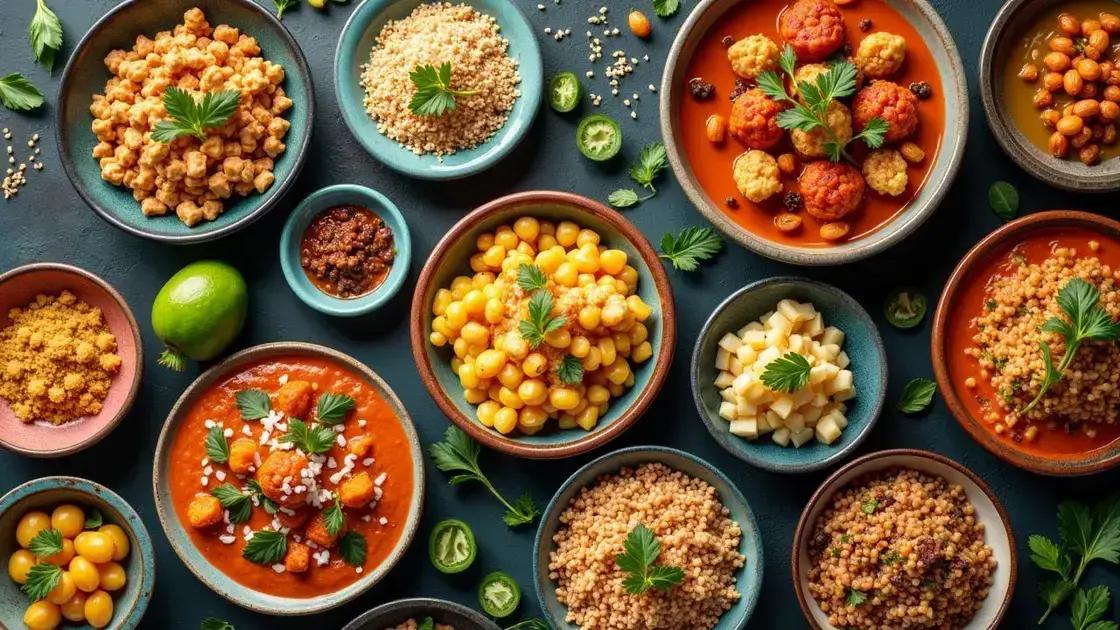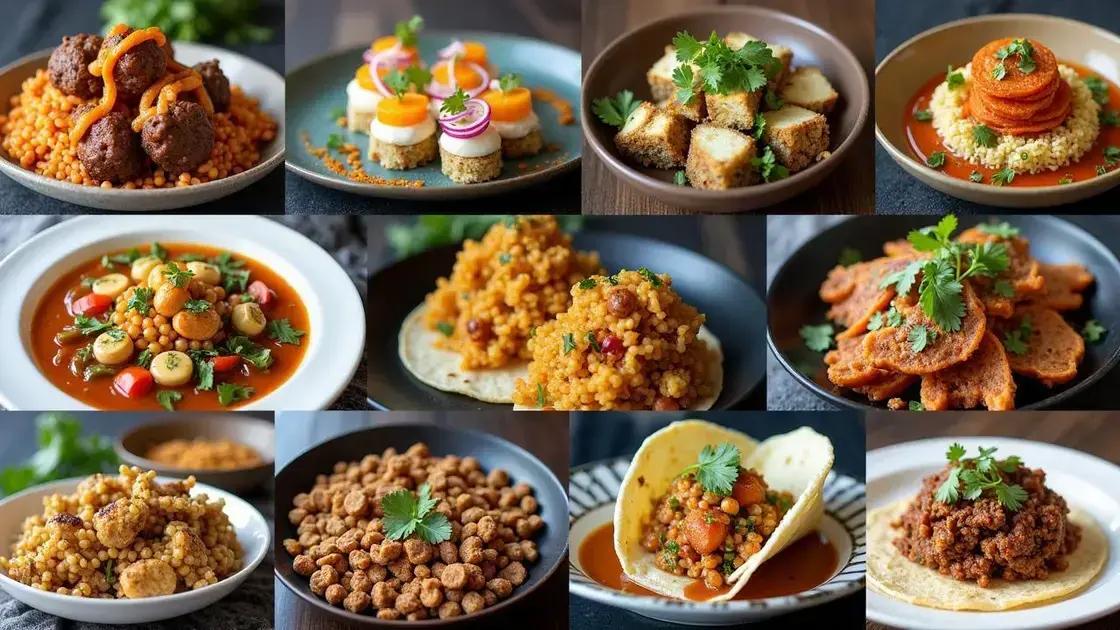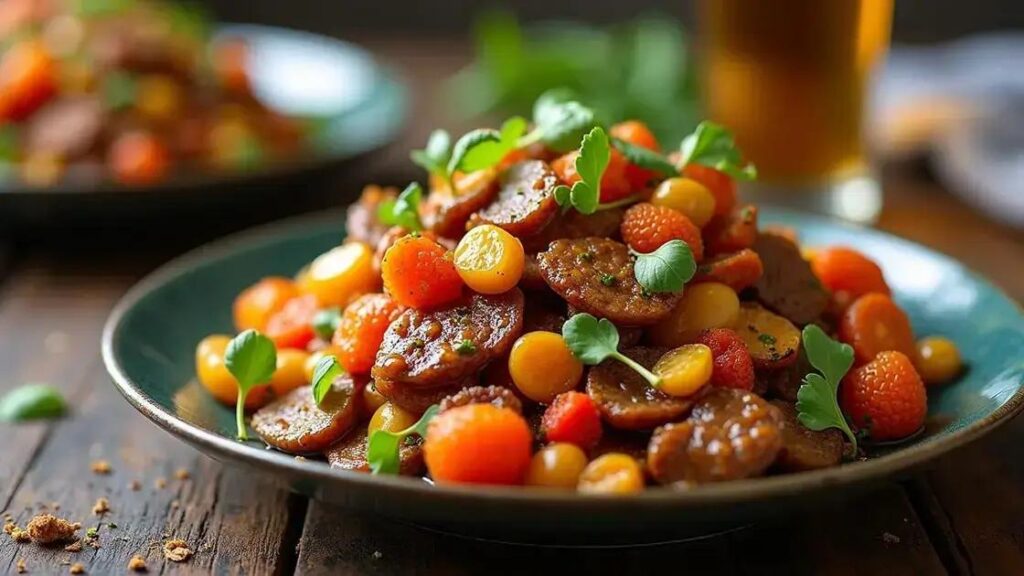Exploring alternatives to the African recipe involves understanding the diversity of African cuisine and incorporating innovative twists on traditional dishes, like fusion recipes and ingredient substitutions, to celebrate and modernize these rich culinary traditions.
Exploring alternatives to the African recipe opens up a world of culinary possibilities. This fascinating journey not only enriches your cooking skills but also leads you to discover the vibrant and diverse flavors that African cuisine has to offer. In this article, we will delve into understanding the diversity of African cuisine and how you can incorporate innovative twists on traditional dishes to create unique flavor experiences in your kitchen.
Understanding the Diversity of African Cuisine

Understanding the Diversity of African Cuisine is crucial to appreciating the rich heritage it embodies. African cuisine is shaped by a variety of factors including geography, culture, and history. Each region boasts its own unique ingredients and cooking methods, contributing to a vibrant culinary landscape.
Regional Specialties
In North Africa, flavors often reflect a blend of Mediterranean and Arabic influences. Dishes like couscous and tagines showcase how spices such as cumin and coriander are used to enhance flavors.
West Africa is known for its use of bold flavors and staple ingredients like rice, beans, and tubers. Jollof rice is a popular dish, often cooked with tomatoes and spices, making it a crowd favorite.
Eastern Africa features dishes like injera, a sourdough flatbread that serves as a base for various stews. The use of legumes and diverse vegetables promotes both taste and nutrition.
Influence of Local Ingredients
African cuisine is deeply connected to local agriculture. Traditional dishes often highlight ingredients native to the region, such as yam, plantains, and various grains. The wise use of seasonal produce not only sustains local farmers but also enriches the culinary experience.
Furthermore, the influence of colonization and trade has introduced new ingredients and cooking techniques. As spices, grains, and cooking methods intersect, African cuisine continues to evolve while retaining its core identity.
Cultural Significance
Food in Africa is not just about sustenance; it’s a medium for cultural expression. Meals often serve as a gathering point for families and communities, playing a central role in celebrations and rituals. Traditional recipes passed down through generations hold both memory and significance.
Through understanding the diversity of African cuisine, one can better appreciate how these culinary practices contribute to cultural identity and community bonds across the continent.
Innovative Twists on Traditional Dishes

Innovative Twists on Traditional Dishes add excitement to familiar recipes, making them more appealing and ready for modern palettes. Many chefs and home cooks experiment by incorporating new techniques and ingredients into African classics. This approach not only highlights creativity but also honors the roots of traditional cuisine.
Fusion Recipes
One popular trend is creating fusion dishes that blend African flavors with global cuisines. For instance, a jollof rice sushi rolls elements of the West African staple into a traditional Japanese sushi roll. By using jollof rice as the base and adding fresh vegetables and fish, this dish invites a world of flavor and texture.
Another example is berbere-spiced tacos. This dish combines the famous Ethiopian spice blend with taco fillings like roasted vegetables or grilled meats. This unique twist creates a delightful fusion of cultures, while still appealing to lovers of traditional taco meals.
Ingredient Substitutions
Innovative cooks often turn to ingredient substitutions to create familiar dishes with new zest. Using quinoa instead of traditional couscous in a Mediterranean salad adds a healthier twist while keeping the essence of the original dish.
Plant-based versions of traditional meat dishes can also deliver new excitement. For instance, using jackfruit as a substitute for pulled meat in a suya dish yields a delicious vegetarian option that captures the flavor without compromising tradition.
Cooking Techniques
Introducing modern cooking techniques can also elevate traditional recipes. For example, adopting sous-vide cooking methods for meats typically braised or grilled helps retain moisture and enhances flavor. Meanwhile, incorporating ‘air frying’ for beloved fried snacks promotes healthier eating without sacrificing taste.
Social media platforms have also played a significant role in inspiring creative twists. Chefs and food enthusiasts share their modifications, encouraging home cooks to experiment with their family recipes. As people seek to explore innovative twists on traditional dishes, this exchange cultivates a community centered around food and creativity.
Embracing New Flavors and Traditions
Exploring alternatives to the African recipe and understanding the diversity of African cuisine encourages culinary creativity. By incorporating innovative twists on traditional dishes, we celebrate the heritage of African cuisine while inviting modern flavors into our kitchens.
Through fusion recipes, ingredient substitutions, and modern cooking techniques, the possibilities are endless. This evolution of traditional dishes not only sustains culinary traditions but also fosters a greater appreciation for the rich tapestry of flavors and cultures across Africa.
As we continue to embrace these innovations, we are not just transforming our meals; we are also creating a global conversation around food, culture, and identity.
FAQ – Frequently Asked Questions about Exploring Alternatives to the African Recipe
What are some popular alternatives to traditional African recipes?
Popular alternatives include fusion dishes like jollof rice sushi and innovative adaptations like berbere-spiced tacos.
How can I incorporate modern techniques into African cooking?
You can use techniques like sous-vide for meats and air frying for traditional snacks to enhance flavors and promote healthier options.
Why is understanding the diversity of African cuisine important?
Understanding the diversity helps appreciate the rich heritage and the various cultural influences that shape African dishes.
What are some ingredient substitutions for traditional dishes?
For example, you can use quinoa instead of couscous or jackfruit as a plant-based alternative to pulled meats in stews.
How has social media influenced modern African cooking?
Social media allows chefs and home cooks to share innovative recipes and adaptations, fostering a vibrant culinary community.
How can I get started with experimenting in the kitchen?
Start by choosing a traditional dish and find a fusion recipe or substitute ingredients to experiment with your own twist.













